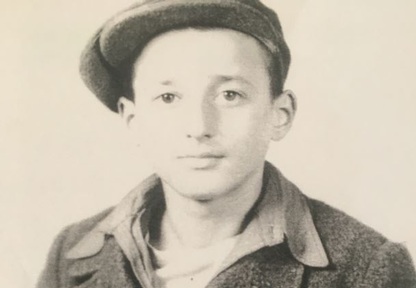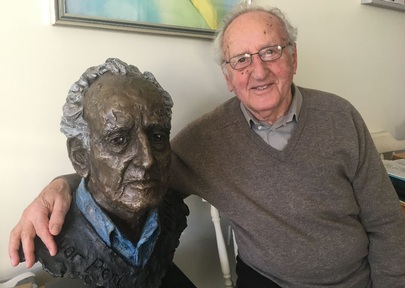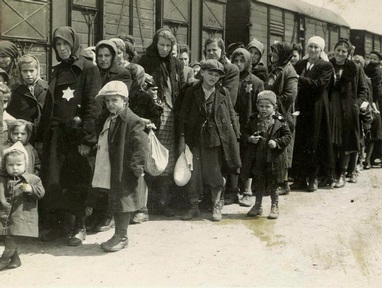Holocaust survivor cried at Auschwitz 'I want to see my Mummy'
Over 200 Holocaust survivors came to Poland’s Auschwitz site on 27 January for Holocaust Memorial Day. But 87-year-old Ivor Perl, who lives in a Jewish Care apartment in London, won’t be there.
He already visited in 1944. He was among the Hungarian Jews sent there to die. In the video below, Ivor told his story to carehome.co.uk from his apartment in Golders Green - one of many retirement flats managed by Jewish Care.
Six million Jews were murdered between 1941-1945 in German-occupied Europe. Over 1 million people were killed at Auschwitz. World leaders including Hungary’s Prime Minister arrived at the former extermination camp for the 75th anniversary of its liberation.
It may be all ‘history’ but, for Ivor Perl, it is very much his story and a very personal tragedy.
Ivor was 12-years-old when his mother and his eight siblings came to Auschwitz by cattle wagon but she and most of his siblings were murdered shortly after their arrival when they were taken to have a fatal ‘shower’.
His parents had been told they were leaving ghetto life and would receive a farm of their own but when they came to Auschwitz, the infamous 'Angel of Death' Dr Josef Mengele was waiting.
Josef Mengele decided who would live and who would die with the flick of a wrist in a white-gloved hand. To new arrivals at Auschwitz he would point left to indicate the gas chamber or right towards slave labour.
From inside the cattle truck, Ivor was able to understand warnings shouted in Yiddish by Polish prisoners, that children must say they are 16. So, when he was asked by Dr Mengele "Wie alt bist du?" the boy of 12, answered quick as a flash "Sechzehn"- a lie that led him away from the gas chamber.
'I want to see my Mummy'

It wasn't long before a camp foreman recruited from the prisoners and known as a ‘kapo’, told Ivor: “You must remember the number not your name. You don’t know your number, you won’t exist”.
Suddenly Ivor began to cry. When asked by a man why he was crying, he replied: “I want to see my Mummy”.
At Auschwitz, prisoners’ numbers were tattooed on their arms. But when Ivor queued for a tattoo, they had run out of ink. An air raid the next day led to him never getting one. Fearful of beatings, Ivor learned his number by heart and remembers it to this day. Prisoner number: 112021.
Instead of celebrating his Bar Mitzvah, Ivor was in Auschwitz and in the camp, death surrounded him. Death slept and walked with him. When he awoke in the morning, some of the bodies packed into bunks near him never moved.
'You either hit him or I'll hit you'
One day, a Kapo saw him arguing with his brother and they were ordered to face each other. Ivor was told “You either hit him or I’ll hit you”. Unsatisfied with the slaps given, the Kapo said: “No, not like that. I’ll show you how”. Ivor and Alec were then forced to beat each other until they bled.
The gates of Auschwitz reads ‘Arbeit macht frei’ meaning ‘Work sets you free’ but work brought Ivor close to death. Half-starved and exhausted from doing the work of an adult, the boy contracted Typhus and lay too weak to move in the camp’s ‘hospital’.
It was his only living brother Alec who persuaded a prisoner to carry Ivor out of the hospital and away from doctors and their gas chamber prescriptions.

Hair made into cloth
Alec also saved him from the children’s block when it was locked up one night. The next morning, they returned to find the block's children had been taken to be gassed.
Ivor grew up in the southern Hungarian town of Mako. He remembers always being treated like “a second-class citizen”, someone to be spat at and insulted but still he wore his “yellow star with pride”.
Fascism had popular support in Hungary - a country that backed Hitler until its government realised Germany may be on the losing side. When Hungary reached out to the Allies, Hitler's troops invaded Hungary and Ivor's town in 1944.
That year, the deportation of Hungarian Jews to Auschwitz began.
World leaders gathered on 27 January to remember and see the Auschwitz site, including a macabre glass exhibit of prisoners' hair. Those once auburn, black, grey locks were removed from people killed in the gas chamber by Zyklon B. Hair from the dead was made into bolts of cloth.
Ivor has something to say about hair. He remembers seeing strangers naked and bleeding – a consequence of being shaved at speed by other prisoners, to rid them of lice at the orders of SS guards.
Shot rabbit stew
When Allied forces were getting closer, Nazi guards forced the brothers to march. A savage hunger relieved only by a little bread went with them on a death march in the bitter cold. The boys walked towards the Tyrol mountains.
When Allies got very close, they fired shots blasting a hole in a camp fence and Ivor ran through it, literally tasting freedom for the first time. In the forest, the boys found a hut and cooked a rabbit that had been shot. That night, two US soldiers knocked on the hut's door. Fearful at first, Ivor says “We were so thankful they didn’t hurt us, we offered part of the stew we made.”
Ivor Perl lives in a flat managed by Jewish Care but residents paid a painful price decades earlier because accommodation is prioritised for Holocaust survivors. Jewish Care runs 10 care homes. It has a Holocaust Survivors’ Centre in London which Ivor visits “every Wednesday” to openly celebrate Jewish traditions.

'Safe space' for survivors
Jewish Care's centre supports over 500 people each year, offering therapeutic support to "victims of Nazi persecution". Survivors like the late Sam Pivnik, who told his story to carehome.co.uk in 2017.
Daniel Carmel-Brown, chief executive at Jewish Care, told carehome.co.uk “The centre was established to provide a safe space and a source of comfort for survivors of the Holocaust and Bosnian genocide. At the centre, survivors can find friendship, support and understanding among those who have shared similar experiences, which is incredibly important for them to be able to do.”
Ivor misses out a lot when he talks to schoolchildren about his childhood. Though it pains him to tell it, Ivor feels it is important no one forgets what happened to millions of people during the Holocaust.
That's why he did not shy away from going to Germany in 2015 to be a witness during the trial of Oskar Gröning 'the bookkeeper of Auschwitz'. Mr. Gröning was accused as an accomplice in the murder of 300,000 Hungarian Jews sent to Auschwitz in 1944.
Ivor watched the former SS guard entering court flanked by nurses but felt “annoyed” at himself for not feeling anger. Addressing Oskar Gröning directly, he told him he had lost too much sleep because of Nazis like him.
In 2019, Ivor returned to Auschwitz for the first time since his captivity to join the 'March of the Living'. He was honoured by the Queen with a BEM (British Empire Medal) for services to Holocaust education. A sculpture has been made of Ivor’s face, so that in 100 years time, people will ask who he was and his story can again be told.
Today's Holocaust Memorial Day is expected to be the last major milestone to feature Holocaust survivors. Ivor challenges you to see the unimaginable. His testimony is a reminder of the depths of discrimination and prejudice against minorities, which is not a distant memory today across Europe and beyond.
Ivor Perl is more than a survivor. His story goes on. Not just looking back, the great-grandfather is looking forward to another milestone…his birthday. On 4 February, Ivor Perl will be 88-years-old.
Latest News
 29-Jul-24
Dementia Bus gives carehome.co.uk staff insight into life with dementia
29-Jul-24
Dementia Bus gives carehome.co.uk staff insight into life with dementia
 01-Mar-24
Find out the top care homes in 2024
01-Mar-24
Find out the top care homes in 2024
 21-Mar-23
UK's top care homes in 2023 revealed
21-Mar-23
UK's top care homes in 2023 revealed
 03-Jan-23
carehome.co.uk launches free care helpline
03-Jan-23
carehome.co.uk launches free care helpline
 13-Dec-22
5 mins with Emily Whitehurst, chief operating officer for Constantia Healthcare
13-Dec-22
5 mins with Emily Whitehurst, chief operating officer for Constantia Healthcare